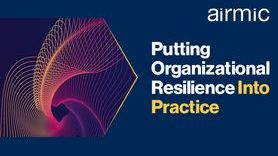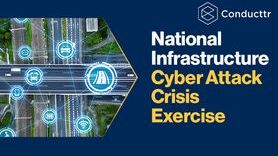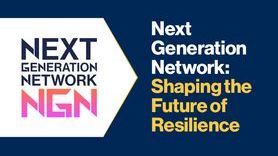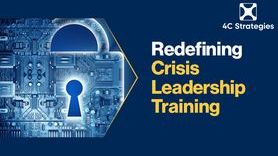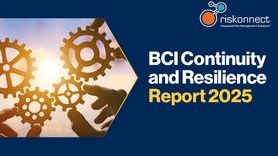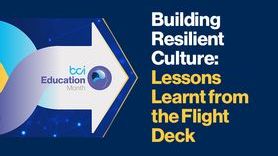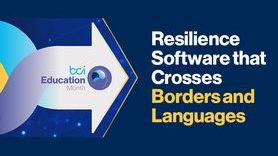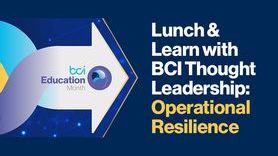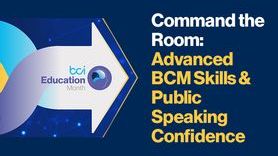In Conversation with Greg Surtees MBCI

As part of Education Month 2022, Greg Surtees MBCI, Business Resilience Manager at the University of Sunderland, UK, spoke to us about the importance of ongoing training to keep up with emerging threats, as well as how critical it is to build your network in order to share knowledge in the Business Continuity (BC) and Resilience sector.
Can you tell us about your experience in the field of BC and Resilience?
I initially fell into the industry from another role. I was working for Kent County Council in the Highways team where I was dealing with a lot of incidents on the road. This meant dealing with the Police, Fire and Ambulance services for a fair amount of the time.
My first introduction to the industry properly was working as a Emergency Planning Officer for the same council. I did that for a couple of years, which felt like a fairly natural progression after the first role. I was working more on the Emergency Planning side of things, dealing with floods, bomb threats, evacuations, etc, but part of my duties was to look after a directorate of the council in terms of BC. We then had an internal restructure and I ended up taking full control of BC for the council up until the time I left.
I then went into the NHS as Resilience Manager for Homerton University Hospital in east London. It was a great couple of years as there was nothing in place when I arrived, so it was a fantastic opportunity to build a BC programme how I wanted to build it and how it suited the hospital (and the wider NHS). In this role, I dealt with a variety of different threats. It was about the same time as the Ebola epidemic in west Africa, so a lot of my time was spent on preparation for that as well as the junior doctor strikes.
After this, I jumped ship into the private sector to work as a Business Resilience Manager for Tesco. This was my first experience of this role in the private sector and I noticed the shift in priorities to being more competitive and keeping key products on the shelves. It also allowed for international work, as Tesco were based in nine countries at that time. I was at Tesco for the first 18 months of the COVID pandemic, therefore my job largely moved towards crisis response.
I then moved across to Sky as an Operational Resilience Lead. It was an interesting change of sector, going from Retail towards Technology, Communications and Media. More recently, I’ve taken over as Business Resilience Manager for the University of Sunderland. Similar to my time in the NHS, this role has given me a fresh start to build a new BC and resilience programme.
What was your educational background?
I received a Bachelors and Masters in History. To be honest, if at that point you asked me about Resilience and BC, I wouldn’t have known where to start. However, while it may not seem a natural first step for BC and resilience, there are quite a few skills that I’ve taken across and use every day. For example, my degrees developed my research and analysis skills, as well as the ability to script an argument based on evidence and then present that argument.
Like most of the people I’ve met who work in this field, while some of the younger ones have done a Disaster Management or Risk and Resilience degree, a lot of people have transferred across from the military, police or something similar. Or, similar to me, they’ve done a degree in something completely different but have managed to transfer some of the relevant skills across into this sector.
In an ever-changing environment, how important are training and education to make sure that you are prepared for newly emerging threats and risks?
It’s absolutely crucial - particularly because of the heavier technological impact and cyber risk. It’s meant we’ve had to upskill as much as possible just to be part of the same conversation as colleagues in the technology department. Likewise, with climate change and travel risks, we’ve had to learn quickly - just like how everyone quickly became an expert on pandemics and viruses after the COVID pandemic.
It's important to stay ahead of the curve because often Resilience Leads/Managers are the ones who have to bang the drum about many of these threats. The pandemic is actually a great example. A pandemic was first on the UK risk register for as long as I can remember but, when COVID hit, everyone was saying that they hadn’t planned for it. If you listened to your Resilience Leads, you would have done.
Staying ahead of the curve often involves a lot of horizon scanning. Even if it’s not formal training and education, just keep on top of what’s happening in the world through the news so that you’re always prepared for what might come down the road.
As an experienced BC practitioner, what skills would you say are important to build in this sector? What skills are you looking to reinforce/acquire in the future?
For someone new coming into this industry, whenever I’ve been in recruitment phases, I’m looking for a number of core skills. I need to be able to put someone in front of leaders and senior management and have them present themselves and their argument well. This involves some negotiation skills at times, as well as the ability to pitch and persuade senior management about the importance of BC and resilience strategies.
The big thing that I always look for is if I can put them in a room with these people on their own. For this, they need to have a personable attitude because a lot of the job is relationship and stakeholder management. Resilience Managers and BC Leads are in this rare position where they deal with all aspects of the organization and they need to build that network quite quickly. You want to build that level of support where they trust you and you trust them. When I’m in a recruitment phase, this is probably around 70% of what we’re looking to find. The other 30% is if they have an analytical way of thinking and have the ability to build concise and clear plans. All of this is absolutely learnable.
For me, I’m now looking to broaden my knowledge base in the risk area. I’ve had some training in Enterprise Risk Management but I want to go into a bit more depth with that. I’ve seen the BC and Resilience industry keep changing over 10 years and I’ve found people pull different things into their own definition of resilience. For me, I’m looking at it from more of a risk perspective and, if I can build that knowledge, hopefully that can help get me in at an early stage of the organization’s strategy discussions when they happen. If I can do that, hopefully then they will be thinking about resilience from an early point.
Elsewhere, I would look at cyber and cloud disaster recovery. I think, particularly post-pandemic, the risk of a loss of property has reduced drastically, but the risk of technology loss has dramatically increased. When I started, technology risk was obviously there but it was nowhere near as big as it is now. However, with hybrid working and everything going digital, it’s everything.
How important is it to share experience and knowledge with other BC practitioners, as well as with those just entering the industry? What are the most effective ways to do this?
I think it’s really important and it’s something I’ve always done. When I was at the council, there was something called the Resilience Forum, which useful as we could hear what others in the public sector were doing.
Similarly, when I was in the NHS, we had an Action Learning Set which included the NHS’ Resilience Managers throughout London. We would meet every couple of months and talk through key issues arising in the sector. You would get a clear picture from this about how other organizations are operating.
In Tesco, we had the Business Continuity Association. Working within resilience in retail meant that we weren’t on the competitive side of the business. For obvious reasons, Tesco would never normally talk to ASDA or Morrisons. While they did communicate for a time during the pandemic, in Business As Usual (BAU) where the laws are the same regarding competition, they wouldn’t really talk with each other. However, our units did because we weren’t looking at it from a competition point of view, or sales, or anything like that. It was simply a case of sharing best practice and learning from each other’s issues, which is really important as we’re all dealing with the same things most of the time (supply chain issues, Brexit, COVID, etc.) For example, after the Grenfell Tower Fire, all the supermarkets and retailers worked together to get resources to the site. Our focus has always been, from a resilience point of view, to share and work together where we can for the greater good.
I also like to keep up with any BCI Chapters when I can and when they’re running. For example, this morning I was on a call for The BCI’s Northeast England Chapter. I also think it’s important to attend events and webinars to meet people, in order to learn from other people’s experiences. At conferences, you get an opportunity to hear how other people approach things.
How did the pandemic impact this?
As much as I love doing things in person, there was an issue before the pandemic where a lot of the time it was ‘come into London for this event’. You then lose half a day, or a day, and end up having to ask for expenses. Moving online also opens it up to other people. The other week I was listening to a webinar from someone in the US and it was interesting hearing how they approach things and how they deal with resilience.
From an employment point of view, you can also open up to a wider network of people as a result of the pandemic. For example, I’m working for the University of Sunderland but am still living in the south at the moment.
Likewise, from a learning aspect, it’s much easier now to hear from people in America, Asia and Australia and get an idea of how they’re developing.
What are the pathways/opportunities available for young professionals that choose a career in BC and Resilience?
I think now is the best time they could join. Being in a post-pandemic world, with the rise of cyber attacks, hostile threats on the geo-political landscape, supply chain resilience, financial issues and climate change, all of these threats are proving the importance of resilience. There are a lot more opportunities opening up as well.
Another thing about resilience professionals is that everyone is happy to have a chat and share whatever they can to help. There’s an active push to broaden the network that we have.
I would also suggest looking at key qualifications that they might want to do, such as the CBCI or at least having the knowledge about it, and reading up on trending topics. I think if they’re going to go for an interview, they’re likely to get questions about things like that. In this situation, being able to share a base knowledge of the core processes and approach is always a good thing.
What can young professionals do to prepare themselves when joining this field from a different industry? What are organizations looking for from young professionals joining this field?
If they’re really keen on resilience and if they are able to, then try and get some voluntary work, particularly in the emergency response area (St John Ambulance, Samaritans, Red Cross, etc.) Just getting used to being in those sorts of environments is always a good thing. Otherwise, look at qualifications and learning and keeping up with what’s going on in the industry. This can be done through LinkedIn, by following the right people, or even by looking at industry websites.
Try sending people a message on LinkedIn, especially if they’re in an industry you’re interested in. By building a relationship, even if they don’t have an opportunity at that point, when they do they’re more likely to think of you and offer you the opportunity.
How can BC practitioners prepare to take the next step or advance in their BC/Resilience career?
A really big part of it is strategy. In the future, I’m looking to do an MBA or something similar to look at the sector from more of a leadership and management aspect. Resilience covers the three strands of strategic, tactical and operational, but it’s very easy to get more involved in the operational work. However, if you’re looking at making your organization as resilient as can be and building that resilience culture, it needs to be at a strategic level. I think you need to be there early on in the process to do that.
Elsewhere, anything that can boost your competency can only be a good thing. This depends on the organization you’re in, but looking more at things like tech resilience, cyber resilience, etc.
You don’t get too many roles that are just ‘BC Manager’ or ‘BC Lead’ anymore. It generally involves that Resilience term now as well. As a result, I think there’s a wider expectation of building on that. So, if you’re traditionally in the BC field, try doing more work on incident management/crisis management. It will build up your repertoire and your confidence in this area. Then, as the industry and your role develops, you’re ready and you’re prepared.
Is there anything else you wish to share about your experience as a BC practitioner?
For me, it’s about building your networks externally and within your organization. It’s important to learn as quickly as you can how your organization works because there’s many people within organizations, and it’s perfectly understandable, who will only focus on their role. If they work in supply chain, they’re only thinking about supply chain and not about distribution or retail. However, as a resilience professional, you need to see the end-to-end process. Building your network internally is always a good idea for this. Also, it’s a good way of getting buy-in within the organization.
I would also advise being there to help on something which you may not normally consider a crisis, but is a crisis to the person involved. If you can get in early and help them out, they’ll remember next time where they need to go if they have an issue. Likewise, they’re going to be more receptive to you in the future when we look to start preparing for these incidents before they happen.
It's a great industry and it’s only going to get bigger, so now’s the time to join if you’re thinking about it.
Learn more about Education Month 2022 and upcoming webinars:
To be the first to know about BCI News and more follow us on LinkedIn here, or on Twitter @TheBCEye




